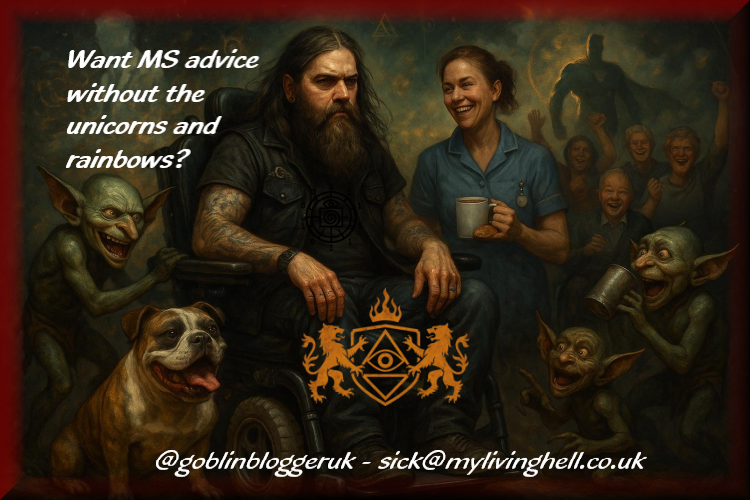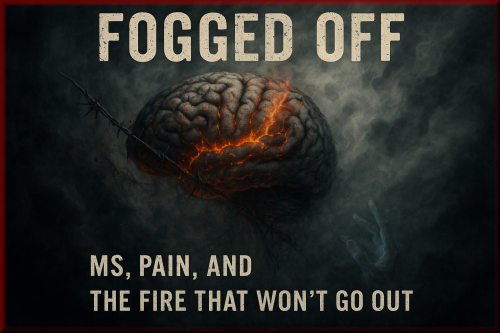- Posted on
⚠️ Please read with care: This blog shares personal, sometimes painful experiences. My intention is to support and speak honestly not to harm. I’m not a professional, just someone who understands how hard it can get. If you're struggling, you're not alone please reach out for professional help.
Living with multiple sclerosis (MS) is a bit like being dropped into a labyrinth where the walls are invisible and the floor is made of Lego. Every day is a surprise party, but instead of cake, you get fatigue, brain fog, and a lottery of weird symptoms. Your body speaks a language all its own a sort of biological Morse code. Spoiler: it’s mostly complaints.
- The Body’s Whispers (AKA the Passive-Aggressive Texts from Hell)
Your body doesn’t scream right away. Oh no. It whispers, “Maybe don’t do that,” in the kind of tone your nan uses when she means “If you do, you’ll regret it forever.” Ignore it, and you’ll get the full “MS meltdown” treatment. Learn to listen to these gentle hints before they become a four alarm disaster. Trust me, your body wants you to fail the ‘ignore me’ test.
- Embracing the Rollercoaster (Or, Why I’m Sometimes a Superhero and Sometimes a Sloth)
MS is the ultimate ride. Some days you wake up and think, “Yeah, I could probably take over the world.” Other days you make sloths look like adrenaline junkies. Don’t fight it. Embrace the madness. There’s no refund for this ticket anyway. If you can laugh when your legs forget they exist, you’re already ahead.
- The Power of Positivity (But Not the Cheesy Kind)
Let’s get real: “positive vibes only” is for people with motivational mugs, not MS. Real positivity is finding a smirk in the struggle. Did you get out of bed today? Bloody legend. Did you find a reason to laugh, even if it was at yourself? That’s winning. Celebrate the tiny victories because some days, they’re all you’ll get.
- Mindfulness: Your Secret Weapon (Or, The Only Time Silence Isn’t Suspicious)
No, mindfulness won’t cure MS, but it might stop you from headbutting a wall. Check in with yourself. Is your body grumbling, squeaking, or plotting revenge? Maybe it’s time for a rest, a stretch, or just a massive bar of chocolate. Mindfulness: because you can’t afford to ignore the warning lights on this old banger of a body.
- Building Your Support Squad (Or, Assembling Your Band of Misfits)
Find your people. The ones who get it, the ones who don’t offer herbal tea as a cure. Whether it’s other MS folk, stubborn friends, or just some poor soul who doesn’t run when you say “incontinence,” keep them close. Empathy makes the pain bearable and the jokes darker. Don’t let anyone tell you it’s weakness to ask for help—sometimes, it’s just good strategy.
- Finding Your Voice (Because Telepathy Still Isn’t Covered by the NHS)
Speak up. For your needs, your rights, your weird symptoms. Don’t let the world turn you into a prop in your own life story. Your voice might tremble, but it matters. The more you say, the more others understand and maybe, just maybe, the world will get a clue.
Bonus Track: The Legend of the Overworked Neuros
Let’s give a round of applause (or maybe just a sarcastic slow clap) for the overworked neurologists. They’re busier than a one-legged man in an arse-kicking contest, running from clinic to clinic, dodging patients like ninjas in white coats. Actual patient appointments? That’s rich. You’re more likely to win the EuroMillions than see one before your wheelchair warranty expires.
The NHS says “your neuro will see you now,” but what they mean is: “He’ll see you on the mural in the waiting room. Or as a hologram projected from his last known location.” Some say if you light enough scented candles and chant “re-referral” three times, a neuro will materialize… but only to tell you that your next appointment is scheduled for June 2036.
The truth is, neuros are overworked too many people, not enough doctors, and a health system held together with sellotape and wishful thinking. But while the overworked neuro vanishes like a magician at a kids’ party, you’re left to decode your own body’s malfunctioning Morse code and hope you don’t accidentally google yourself into a full blown panic attack.
If you do spot a neuro in the wild, be gentle. They scare easily and may bolt for the exit if approached. In the meantime, keep calm, decode your own symptoms, and remember Dr. Google and Nurse Sarcasm are open 24/7.
Bonus Track 2: The Thankless Saints MS Nurses
While the neurologists are off playing hide and seek, let’s talk about the true legends: MS nurses. They’re the ones on the ground, fighting fires with a teaspoon and answering emails like their keyboard’s on fire. Somehow, they manage to be calm, knowledgeable, and kind even when you’re one question away from a meltdown and have already left nine voicemails.
MS nurses are the unsung therapists, detectives, and sometimes part-time magicians (“You’ve tried turning it off and on again? Excellent now have you tried snacks and a nap?”). They field the panicked questions neuros don’t have time for, translate medical jargon into English, and manage to keep us (and sometimes themselves) just the right side of losing it.
Are they overworked, underpaid, and under-appreciated? Of course! Do they do it anyway, with a level of patience and gallows humour that should earn them a sainthood (or at least hazard pay)? Absolutely.
If you’re lucky enough to have an MS nurse who answers the phone and doesn’t flinch when you ask if your “weird new symptom” means you’re dying buy them a coffee. Or a spa weekend. Or just send a thank you meme. Without them, the whole bloody NHS MS system would collapse faster than my legs after a walk to the fridge.
So here’s to the MS nurses: holding it all together with skill, sweat, and the sort of thankless determination that deserves a medal (or at least a pint).
Bonus Track 3: The Unsung Heroes Support Groups, Volunteers & Charities
If you think the NHS is barely clinging on, imagine life without the MS support groups, charities, and stubborn volunteers who do it all for the love of the cause (and maybe the free biscuits at meetings).
Support groups: These legends run by people who actually get it are the real backbone of the MS world. They’re the ones who answer your late night freak outs, decode the NHS bureaucracy, and know which GP receptionist has the good biscuits. In-person, online, or just a WhatsApp meme away, they turn “I’m losing my mind” into “You’re not alone, mate.”
Volunteers: The ones who give their time for free, organizing meet-ups, fundraising, sending out info packs, and listening to rants from people like us without ever losing their patience. Half the time, they’re managing their own MS or supporting someone who is but you’d never know, because they’re too busy holding everyone else up.
Charities: Whether it’s the MS Society, MS Trust, Shift.ms, Overcoming MS, MS-UK, or any of the local grassroots warriors, they’re out there lobbying, funding research, and somehow keeping hope alive in a world that sometimes feels like it’s sponsored by despair. Without them, you’d still be Googling “what the hell is MS” while the NHS phone queue loops you back to start.
Are they underfunded, overstretched, and powered mostly by stubbornness and biscuits? You’d better believe it. Do they keep the whole community from falling through the cracks? Absolutely.
So here’s a genuine, sarcastic-but-serious thank you to every support group, volunteer, and charity keeping the MS circus running. If you ever wondered who the real unsung heroes are it’s the lot turning lived chaos into lifelines.
Raise a mug (or a wheelchair, or just an eyebrow) for them they’ve earned it.
Conclusion: Embrace the Weird, Survive the Storm
Living with MS means forever learning a new dialect of pain, fatigue, and absurdity. The “invisible code” is always changing, but your ability to listen and laugh might just be the best tool you have. Don’t sugar-coat it. Don’t let anyone else either.
So here’s to listening to your body, celebrating every little win, and flipping MS the metaphorical V-sign as often as possible. You’re not alone. And you’re not invisible.
Now, go on decode the next bloody signal. And if you’re looking for rainbow platitudes, you’re in the wrong blog.
I write in ink and fury, in breath and broken bone.
Through storm and silence, I survive. That is the crime and the miracle.

